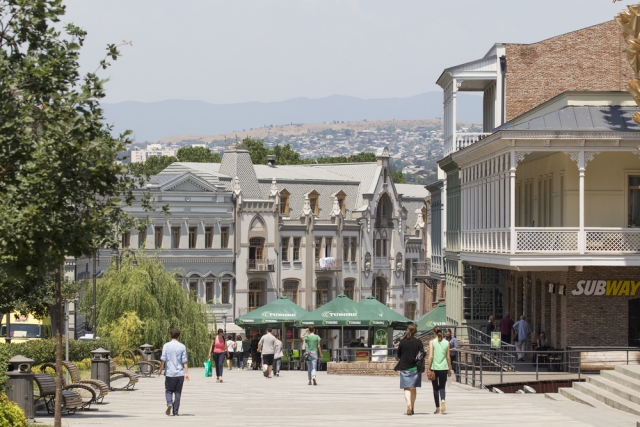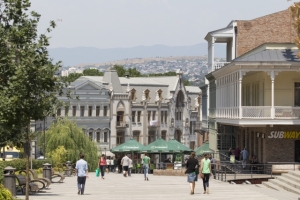IRI Polls Show Georgians See Political and Economic Threats in Russia
TBILISI - The International Republican Institute (IRI) has published the results of its survey, which show respondents' distrust of Russian motives as well as a desire to maintain relations.
73 percent of respondents view Russia as a political threat, and 57 percent see it as an economic threat. A vast majority (76 percent) view the current state of Georgia’s relationship with Russia as “bad,” yet a combined 82 percent “fully support” (53 percent) or “somewhat support” (29 percent) continued dialogue—a figure consistent with previous IRI polls.
Moreover, 60 percent of respondents believe that Russian aggression towards Georgia still continues. 23 percent said the Russian aggression was over, though it might resume again. 10 percent said the aggression was over and did not expected it to resume.
To the question ‘How safe they felt in Georgia due to the Georgian-Russian relationship,' 47 percent of respondents said they felt more protected than unprotected. 28 percent said they were more unprotected than protected, 11 percent said they were protected, while 9 percent said they were unprotected.
The research showed that 64 percent of the interviewed respondents fully support the European Union (EU) membership, while 26 percent partly support the country’s pro-western course. As for Georgia's accession to NATO, 56 percent fully support it, 26 percent partly support the move, and 7 percent strongly oppose Georgia’s joining the alliance.
In response to questions about national politics, 26 percent of respondents said they would vote for the ruling Georgian Dream (GD) if local elections were held next Sunday. 12 percent of those interviewed said they would vote for the opposition party, the United National Movement (UNM), followed by the Movement for Liberty - European Georgia - with 7 percent. 50 percent did not name any party. For ratings of political leaders, the list is led by the President of Georgia, Giorgi Margvelashvili with 67 percent of votes, followed by the Health Minister Davit Sergeenko with 65 percent, Prime Minister Giorgi Kvirikashvili with 55 percent, and the European Georgia leader Davit Bakradze with 50 percent. 92 percent of the respondents support direct election of the president. Only 5 percent support election of the president by the parliament, while 3 percent did not have an answer to the question.
Unemployment was named as the country's top problem by 47 percent of the interviewed, which is consistent with IRI’s March 2016 poll (45 percent). Unemployment was also named as the primary problem facing respondents’ towns or villages (35 percent) and households (42 percent). A combined 70 percent think that the economic situation has “worsened somewhat” (34 percent) or “worsened a lot” (36 percent) in the past two months. In the long term 69 percent feel that the direction of the economy has “regressed” over the past four years.
Among institutions, the Georgian church is leading with an approval rating of 88 percent, followed by the army with 86 percent, the media with 74 percent, the police with 59 percent, the Presidential Administration with 55 percent, the Ministry of Education with 52 percent, the PM's office with 45 percent approval, the Central Election Commission with 40 percent, the Public Defender's Office with 39 percent, Parliament with 39 percent, and the Cabinet of Ministers with 38 percent approval.
The majority Georgian Dream party does not trust the IRI research. They say the elections will show the real picture. “We should not rely on the polls,” said GD member Gia Volsky. The opposition UNM party trusts the polls. According to them, the rating of the GD has fallen and the UNM is the leading opposition force. “Unfulfilled promises and the feeling of instability have caused the fall of the ruling party’s rating,” UNM member Nugzar Tsiklauri said.
The Movement for Freedom – European Georgia party also believes the results of the IRI research should be trusted. “The polls reflect the reality in the country. It is obvious that the country is in deep crises, which was caused by the 5 year governance of the GD,” Levan Tarkhnishvili, a member of European Georgia, said.
The survey was conducted by Baltic Surveys/The Gallup Organization on behalf of IRI’s Center for Insights in Survey Research.
The fieldwork was carried out by the Institute of Polling & Marketing. Data was collected throughout Georgia (excluding the occupied territories of Abkhazia and South Ossetia) between February 22 and March 8, 2017, through face-to-face interviews at respondents’ homes.
The sample consisted of 1,501 permanent residents of Georgia, all 18 years and older and eligible to vote, and is nationally representative.
By Thea Morrison
Photo source: blog.radissonblu.com












